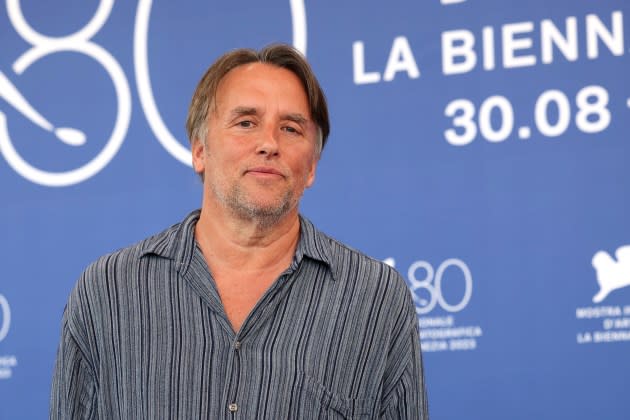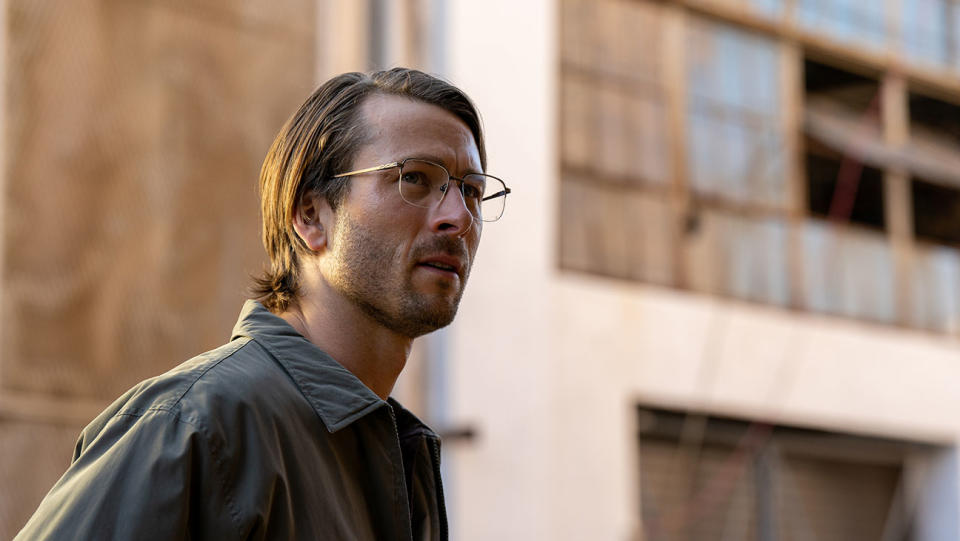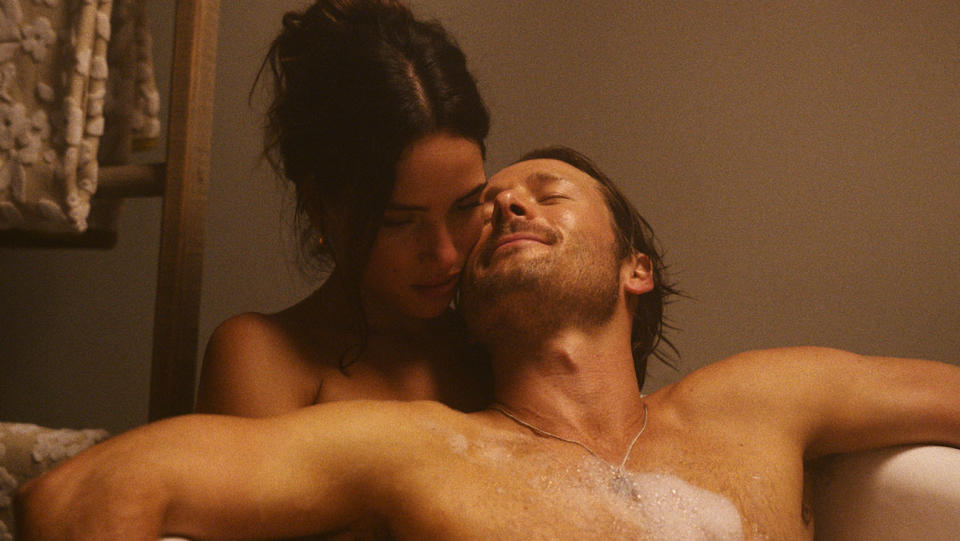Richard Linklater on His Comedy Thriller ‘Hit Man’ and Why Indie Movies Might Be “Gone With the Algorithm”
- Oops!Something went wrong.Please try again later.
- Oops!Something went wrong.Please try again later.
- Oops!Something went wrong.Please try again later.

Even for indie maverick Richard Linklater, his 23rd feature Hit Man is an inventive blend of genres and tones: black comedy, romance, noir, thriller and psychological study. But all of it told with a delightfully light touch.
The film is based on a true-crime magazine article written by Skip Hollandsworth, the Texas-based journalist Linklater collaborated with on his 2011 film Bernie, starring Jack Black. Hit Man tells the story of Gary Johnson — a real-life, mild-mannered psychology professor who moonlit as an undercover hitman for the New Orleans police. When he breaks protocol to help a desperate woman trying to flee an abusive boyfriend, the character finds himself becoming one of his false personas, falling for the woman and flirting with turning into a criminal himself.
More from The Hollywood Reporter
Telluride Post-Fest Analysis: Feinberg and Keegan on Rocky Mountain Highs and Lows
Mrs. Tweedy Returns for More Fowl Play in 'Chicken Run: Dawn of the Nugget' Teaser
The film is led by two intensely charismatic performances from Glen Powell (Top Gun: Maverick, Linklater’s Everybody Wants Some!!) and Adria Arjona (Morbius). Powell also collaborated with Linklater on the script for his first screenwriting credit. Ahead of Hit Man’s world premiere at the Venice Film Festival, The Hollywood Reporter connected with Linklater to discuss the film’s creation and philosophical underpinnings, as well as the current state of American indie cinema.
(The following conversation contains spoilers from Hit Man.)
What were the creative origins of this film, and how did your intentions for it develop over time?
Like a lot of films for me, it had a super long gestation period, in that I read Skip Hollandsworth’s article when it came out back in 2001. I’m friends with Skip and he has such a nose for true crime and unique characters. And this character, Gary Johnson, the undercover hitman, opened up such a fascinating world — these people who want to hire someone to kill someone. That’s about as extreme as it gets in the world, right? And yet, the facts on the ground in the real-life cases were so chillingly banal.
I’m the kind of person who goes to trials and watches cases, and it just fascinates me. You know, watching a murder trial and saying to yourself, “Wow, that person really did it.” So, when I read the original article, I thought this material would be a great place for a dark comedy to take place. I had a few meetings about it over the years, but it just didn’t take off as a full story — until Glen Powell called me up during the pandemic and said, “Hey, I just read this great article about a hitman.”
The article covers how Gary let off a young woman. So, when Glen and I got to talking, we thought, “What if she called him up afterward?” We got really fascinated about what that relationship could be. The general premise and the character of Gary are based on the real guy, who passed away, sadly, just a few weeks before we went into production. But the relationship with the woman is a complete flight of fancy — which was so fun to do, because it was all so plausible.
We knew Gary would have seen the girl’s photo when he was doing his case research, and if she was a pretty girl, it’d probably be pretty natural that he would pick a guy who’s pretty cool when he’s developing his undercover persona for her case. But then, if they have a connection and she calls him up later, he’d be stuck in that undercover persona when he wants to see her again. So, the story could become this whole question about identity. The real Gary was also a professor who lectured on psychology, so there was a natural way to explore some of these things that interested us. And the story offered a lot of opportunities to blend genres in surprising ways.
What kind of research materials did you have access to?
They came from Skip Hollandsworth when he wrote the Texas Monthly article. He’s so thorough and he just keeps all this stuff. He gave me a couple of boxes full of interview transcripts and a lot of shitty VHS tapes of bad surveillance camera footage. It could be a camera at a bad angle — surveillance cameras have advanced a lot since then — showing a society lady in a nice hotel room, talking to the real Gary and trying to hire him to kill someone. The recordings were bad, but you watch these moments and it’s just unbelievable. I was really amazed by just the banality of the way they discuss it all. Chatting about how they would like it done. It was like someone purchasing any other service in our consumer society. It was breathtaking stuff.
Did some of that material make it directly into the script?
Yeah, some of those characters you couldn’t really make up. Like the teenage boy wanting to kill his mom and trying to pay for it with video games. That was real. It’s amazing how cheap they thought it could be — that it’s not particularly expensive to have someone killed. It showed how deluded and naive people can be and how, if you want something bad enough, you’ll just fill in all the blanks and believe it. All Gary had to do was sit there and be accommodating, and let them hang themselves with their own words. I talked with some of the DAs and prosecutors who worked with him, and they all said that Gary was the best at what he did because his research was so thorough. They almost always got a conviction with his cases.
This is Glen Powell’s first credit as a screenwriter, right? What was the co-writing process like?
It was very natural. In my process, I always bring the script to the actors and make lots of revisions during the rehearsal process with their input. But with this one, because we were working on it over the pandemic, we had plenty of time. So we were talking almost every day really early on. At some point, I said, “Let’s save a step and just write this thing together.” That’s what I did with Ethan [Hawke] and Julie [Delpy for Before Sunset and Before Midnight]. Glen was a great creative partner. He’s a fucking smart guy and he’s so curious about stuff. We could just talk for hours and really dig into the story and details. And it was Glen who really ran with those false identities that Gary creates for each of his cases. The real Gary did slight disguises, but not to the extent in the film. I was like, “Should we really do a Russian accent?” But Glen just pushed all of that to the max and I loved how it came out.

The two lead performances here are so enjoyable. It really feels like big, star-making turns for the both of them.
Oh man, thank you. I agree. Of course, I’ve known Glen for a while, but I didn’t really know Adria before this. She came in and was just fantastic to work with. I really felt those two were just off to the races from the jump together. It was really fun to watch.
I suppose the most difficult aspect of the Gary character was convincingly making Glen Powell into a guy who’s kind of a dork at the start of the film?
Yeah, we’ve got a little bit of a Clark Kent thing going on there, for sure. (Laughs.) But, that was the hard part. Are people ever going to believe that Glen Powell is a dorky guy? He’s such a ridiculously handsome dude. But I tell you, Glen has this super heady, intellectual, potentially nerdy side to him. It doesn’t scream out, but it’s there. That’s why I think he loved this part so much. But I knew it’d be very satisfying to see Ron [the slick, confident alter-ego Gary creates when he meets the young woman], because we all know Ron is closer to the real Glen. So it’s kind of triumphant when Ron emerges, and it was fun to play to those colors for the audience.

I’d love to ask you about the philosophy that’s in the background throughout the film and that kind of frames the whole story. At the end, Gary espouses a belief in a Nietzschean form of relativism, or a collectivist view of moral truth, with a strong emphasis on individualism.
Yeah, the idea that reality isn’t fixed. That came from stuff I’ve read. I’ve seen my own views change so much, so at some point you ask, “Well, what is truth? Is it fixed?” You go through post-modernism, and for me that’s always on the table. And these times seem to call for it more than ever. It’s a cultural understanding I think — what is true? — and we see it being questioned in all of these facets of contemporary life. But here, we chose to take it in a direction that I think is more positive, with regard to identity. The idea that you’re not fixed. We’ve all known people who just inevitably get worse and become a total shitbag. But there’s also the notion that you can actually become a better, changed version of yourself — the whole “as if” principle — and not just be bullshitting.
I really loved that empowering notion. But then, the classic counterposition to relativistic views of morality is that they can lead to a form of sociopathy — that in the absence of absolutes, someone could self-justify almost anything, even killing. Your characters do just that, and it becomes the whole basis of their love story! So what are we supposed to make of this?
You’re at the dark heart of the dark comedy here, aren’t you? Yes, Gary is not the most reliable narrator. It’s on the audience. The tell is right off the bat when Gary says, “There I was, minding my own business, when my life changed in the most surprising way.” Because, no, you weren’t just minding your own business; you were part of a surveillance team and a sting operation entrapping some poor soul who wanted to kill someone. You were doing the opposite of minding your own business. So that sets it off. But it all goes back to that eternal Raskolnikov, which is a rich area. It’s the central tenant that’s motivating so many of these characters: Is your life better off if this one person is no longer in the world? So yeah, the irony isn’t lost. Their whole future happiness is based on doing exactly what Gary put people in prison for. My note is: “Don’t be so sure that anyone is above that.”
There were moments when I found myself almost reading the film as a romantic allegory — that every courtship entails a fake hitman and every love story is two sociopaths coming together.
Fair enough, indeed. There’s that line, “Behind every great fortune, there’s a great crime.” And behind every great love story, there’s probably a lie — or a certain misrepresentation. How long can you keep it up? How long can you put your best foot forward until the baggage arrives? Because show up, it will. So the movie has its own little time-release formula to it. You know when Gary’s talking to his ex-wife, whom he’s still great friends with, she says, “You just need to find someone who’s fucked up in a way that works with the way that you’re fucked up.” So we get to see that. And the partners in crime, or lovers on the run, thing is always interesting to me — you know, Double Indemnity [1944]. It’s romantic because it’s a real commitment. You’re getting on a train together that ends at the graveyard.
You’re such a pioneer of American indie cinema. Do you think a career like the one you’ve cut out for yourself and enjoyed over the years is possible anymore? How do you view the current state of American moviemaking coming out of the pandemic?
It feels like it’s gone with the wind — or gone with the algorithm. Sometimes I’ll talk to some of my contemporaries who I came up with during the 1990s, and we’ll go, “Oh my God, we could never get that done today.” So, on the one hand, selfishly, you think, “I guess I was born at the right time. I was able to participate in what always feels like the last good era for filmmaking.” And then you hope for a better day. But, man, the way distribution has fallen off. Sadly, it’s mostly just the audience. Is there a new generation that really values cinema anymore? That’s the dark thought.
I have a film society and I run into so many young, cinema-loving kids who have the Criterion Channel and they watch all kinds of amazing movies. But I know that, culturally, that’s an exception. I fear that there’s not enough of a critical mass in the culture to sustain what was. But who knows? I don’t think I have any deeper analysis than anyone else would, and it’s not in my nature to make huge statements about whether it’s all over. I just feel we’re all treading water and hoping we don’t drown. Challenging times are certainly here.
With a changing culture and changing technology, it’s hard to see cinema slipping back into the prominence it once held. I think we could feel it coming on when they started calling films “content” — but that’s what happens when you let tech people take over your industry. It’s hard to imagine indie cinema in particular having the cultural relevance that it did. It’s hard to imagine the whole culture is going to be on the same page about anything, much less filmmaking. We can be self-absorbed and say it’s just about cinema, but it’s really all of our modern cultural life. You could say the same things about reading books. A lot of young people can’t really read a book, because they’re just on their phones.
Some really intelligent, passionate, good citizens just don’t have the same need for literature and movies anymore. It doesn’t occupy the same space in the brain. I think that’s just how we’ve given over our lives, largely, to this thing that depletes the need for curating and filling ourselves up with meaning from art and fictional worlds. That need has been filled up with — let’s face it — advanced delivery systems for advertising. It’s sad, but what can you do? I also don’t want to go through life thinking our best days are behind us. That’s just not productive. So, in your own area, you just have to persist and do what you can on behalf of the things that you believe in. You have to believe that everything can change and that things can go back to being a little better. Isn’t that what we all want for everything these days, from democracy on down? Can’t we just go back to being a little better?
Turning to Venice, there are so many great films being shown this year. I don’t know about you, but when I go to festivals, it almost feels like you get dosed with Great Cinema. I often find myself — in the midst of that process of experiencing so much diverse and impressive film — reexamining what cinema means and why it’s important to me. Do you ever still wrestle with those questions?
Oh yeah, absolutely. You know, it’s a real privilege, because a lot of the films that play at these festivals might not ever play in theaters or don’t end up ever getting widely seen. We’re all sort of in that roulette wheel of popularity. But just to know that all of those great films are out there is a reassurance. In my heart of hearts, I know that the percentage is still the same and that there are a ton of great films being made every year worldwide, without pause. That alone should give us some hope. We can bemoan the state of the industry, but that’s a cliché and people have been doing it forever. For so many people across the globe, this is still their art form. That’s how they want to communicate and there’s a lot of collective, creative energy still pouring into moviemaking. So, at the festivals, I suppose you can feel that more optimistic side of the story. It’s a push and pull — it always has been. I like to be cautiously hopeful.
Interview edited for length and clarity.
Best of The Hollywood Reporter
Kim Cattrall and Five Actors Who Made Surprising Returns to a Role
10 Times Hollywood Predicted the Scary (or Not So Scary) Future of AI
21 Actors Who Committed to Method Acting at Some Point in Their Career

